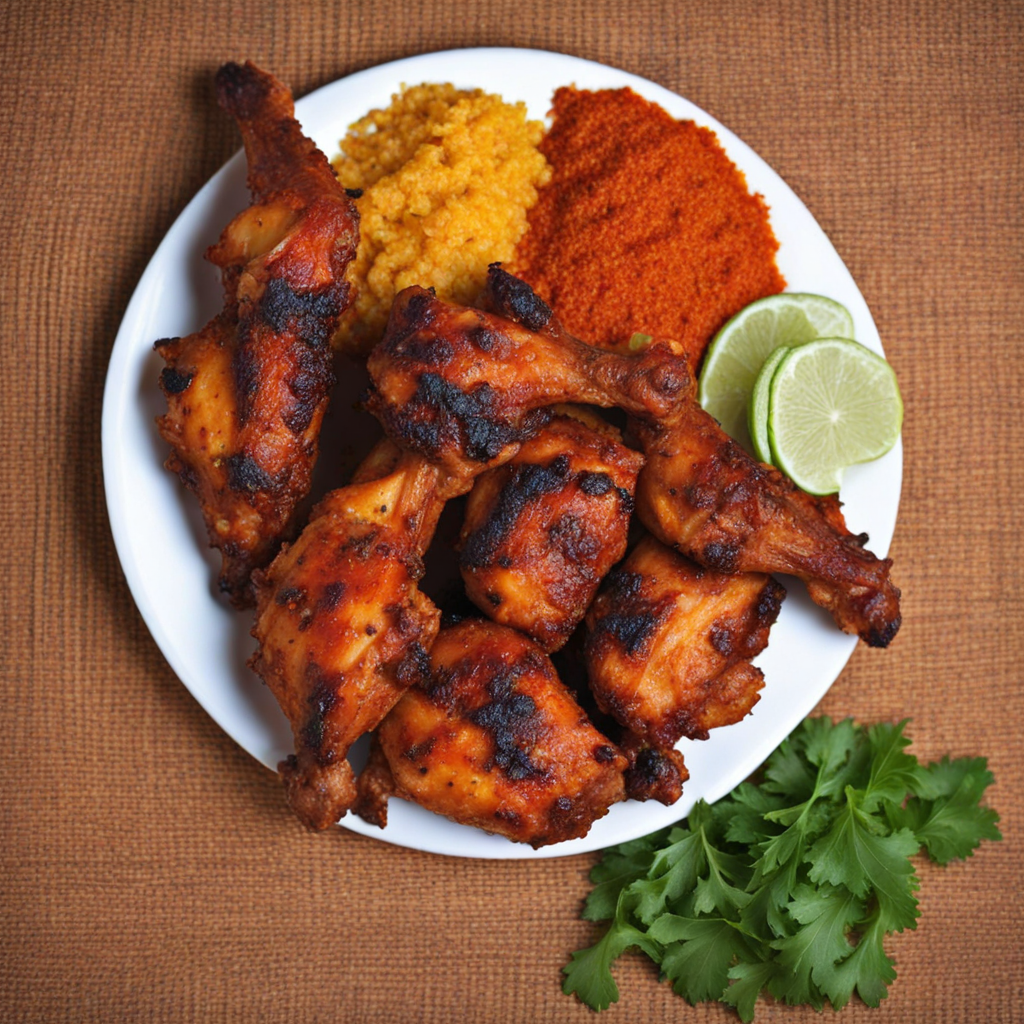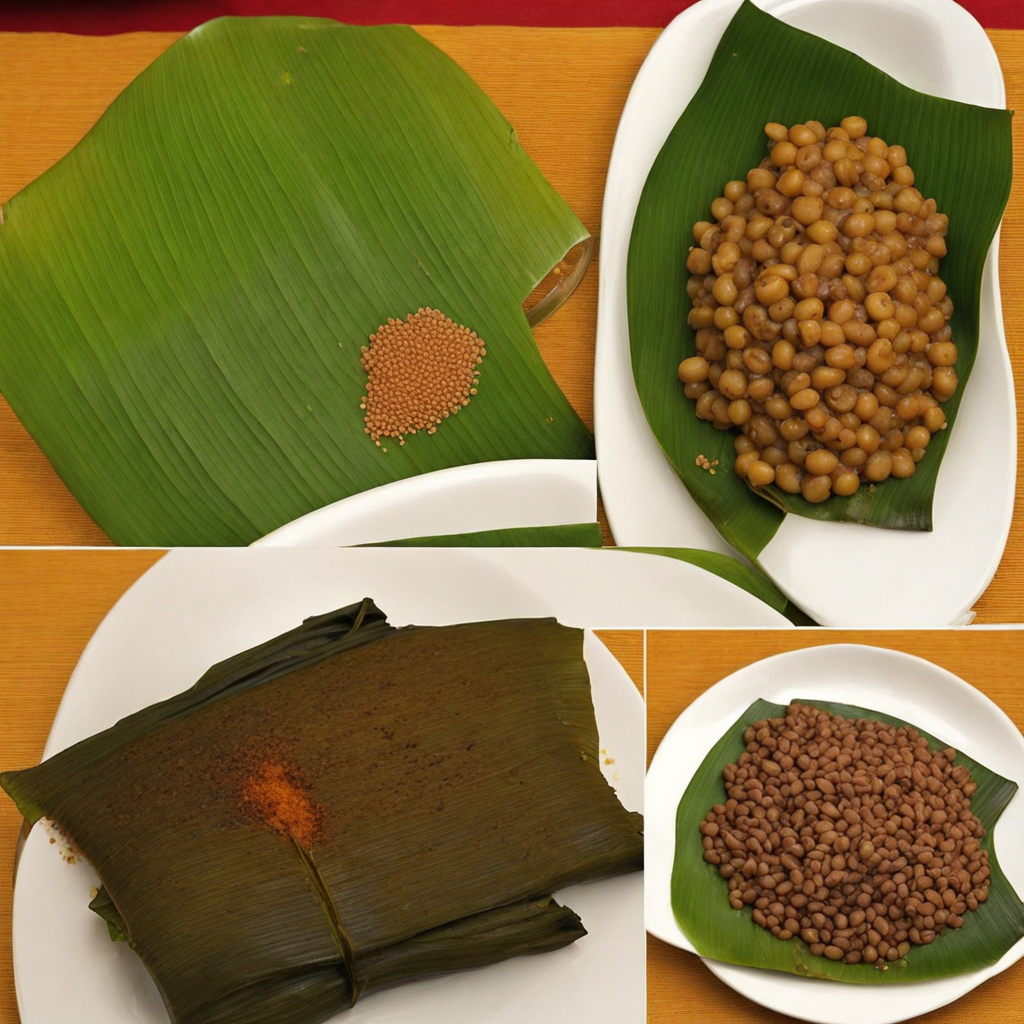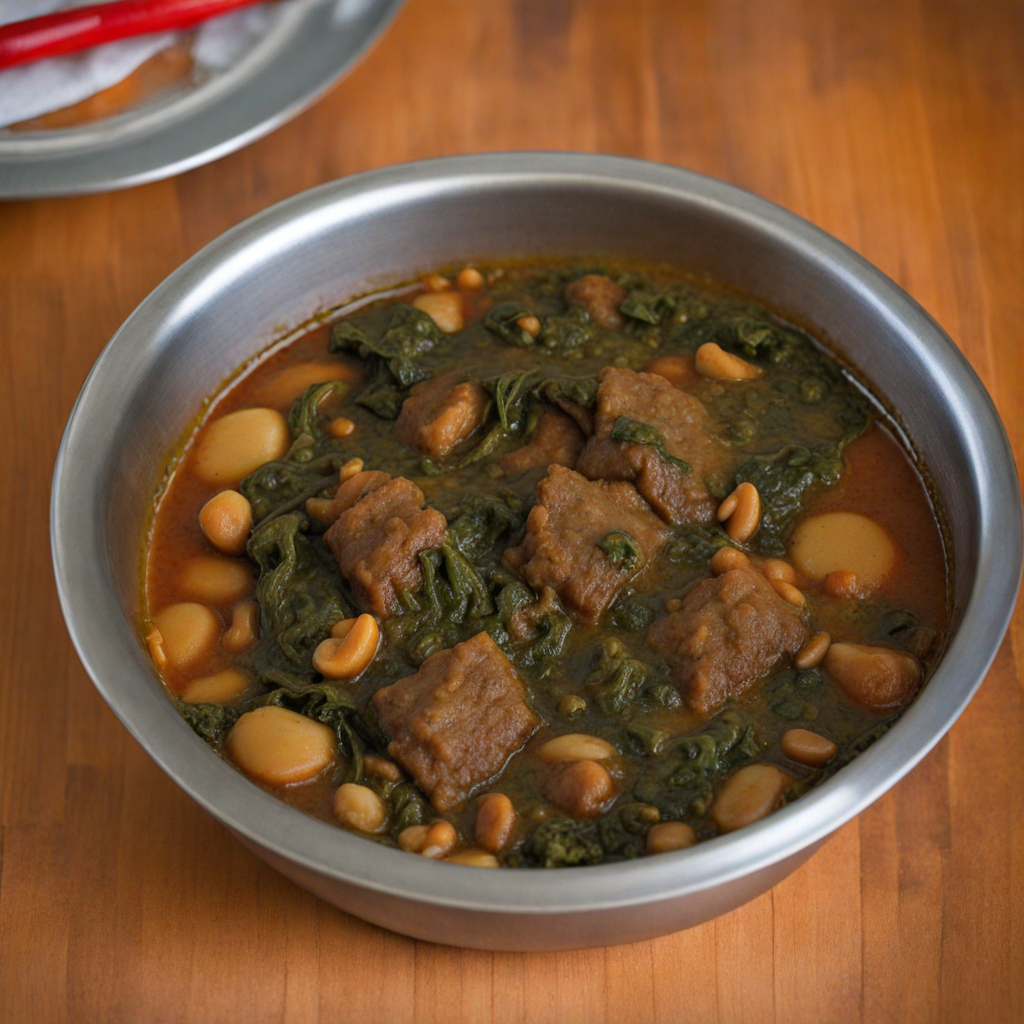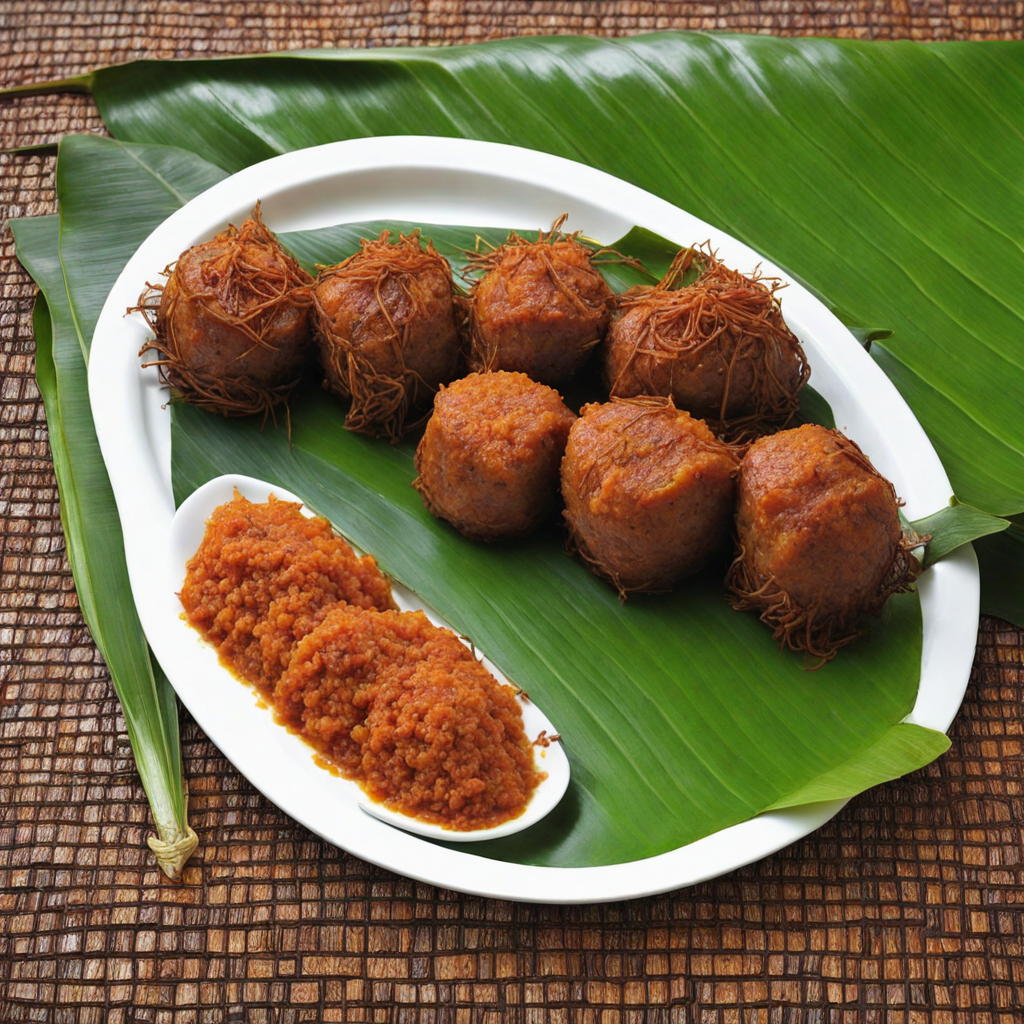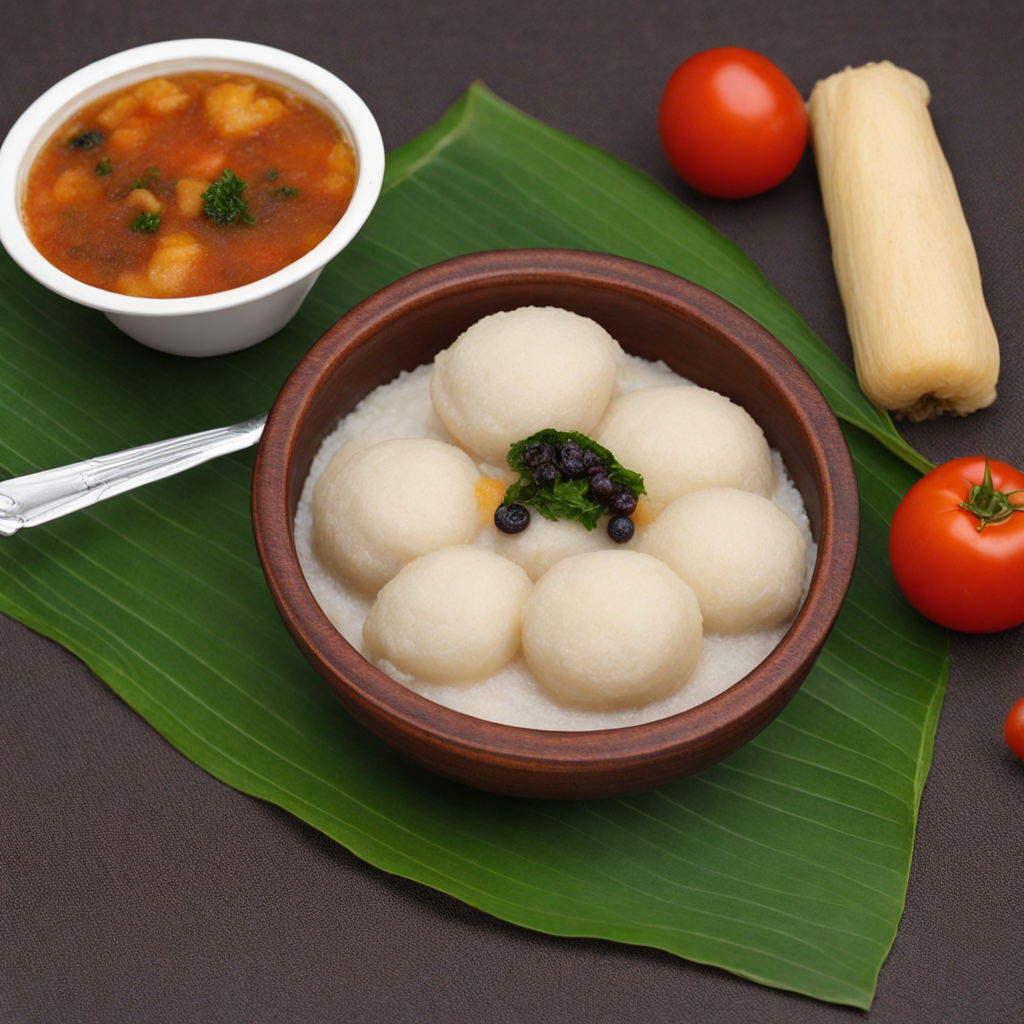Kati Kati
Kati Kati is a delightful Cameroonian dish that embodies the rich and diverse culinary traditions of the region. This dish primarily features marinated grilled chicken, which is often spiced with a blend of local seasonings that include garlic, ginger, and a touch of chili for heat. The chicken is typically cooked over an open flame, allowing the smoky flavors to infuse the meat, resulting in a tender and juicy centerpiece that boasts a tantalizing aroma. The marinade, often made with palm oil, imparts a vibrant color and depth of flavor that will excite your taste buds with every bite. Accompanying the Kati Kati are traditional side dishes that enhance the overall experience. Commonly served with fried plantains, which add a sweet and starchy contrast to the savory chicken, and a side of spicy pepper sauce, this dish invites you to customize each mouthful according to your taste. The sauce, made from fresh tomatoes, onions, and a variety of spices, packs a punch and elevates the dish to new heights, making it a flavorful delight that keeps you coming back for more. Eating Kati Kati is not just about the food; it's about the communal experience that often accompanies it. Traditionally enjoyed in a group setting, this dish fosters a sense of togetherness as family and friends gather around to share in the meal. The vibrant colors, aromatic spices, and the warmth of the grilled chicken create a feast for both the eyes and the palate, making Kati Kati a must-try for anyone looking to explore the bold and exciting flavors of Cameroon.
How It Became This Dish
Kati Kati: A Culinary Journey Through Cameroon #### Origins Kati Kati, a traditional dish from Cameroon, is a vibrant representation of the country’s diverse culinary heritage. This dish primarily consists of grilled chicken marinated in a blend of spices and served with a spicy sauce, often accompanied by a side of plantains or rice. The origins of Kati Kati can be traced back to the various ethnic groups that inhabit Cameroon, each contributing their unique flavors, techniques, and ingredients to the dish. Cameroon is often referred to as "Africa in miniature" due to its geographical and cultural diversity. The country is home to over 250 ethnic groups, each with its own traditions and dishes. Kati Kati is particularly popular among the Beti, Bantu-speaking peoples of the central region, but its appeal has spread throughout the nation. The name "Kati Kati" itself is believed to derive from the Beti word for "to cut," which refers to the way the chicken is prepared and served. #### Cultural Significance Kati Kati is more than just a meal; it embodies Cameroonian hospitality and community. Traditionally, this dish is often prepared for special occasions, family gatherings, and celebrations, such as weddings and festivals. The act of grilling chicken over an open flame is a communal activity that brings people together, strengthening social bonds. In the context of the Beti culture, food is an essential part of social life, symbolizing respect, affection, and solidarity. When preparing Kati Kati, the host not only showcases their culinary skills but also their ability to foster connections through food. Sharing a plate of Kati Kati, often served on a communal platter, encourages interaction and conversation, making it a centerpiece of social gatherings. Kati Kati is also steeped in ritual significance. In some communities, the preparation of the dish involves prayers and blessings, reinforcing the idea that food is a sacred gift. The use of specific spices and herbs is believed to enhance not just the flavor but also the spiritual experience of dining. #### Development Over Time The preparation of Kati Kati has evolved over the years, influenced by globalization, migration, and the exchange of culinary practices. While the traditional methods of grilling and marinating have remained, modern twists and adaptations have emerged, reflecting changing tastes and lifestyles. In its traditional form, Kati Kati is made by marinating chicken in a mixture of palm oil, groundnut paste, garlic, and a variety of spices, including chili peppers, ginger, and onions. The marinated chicken is then skewered and grilled over charcoal, imparting a smoky flavor that is quintessential to the dish. This method of cooking is deeply rooted in African culinary practices, where grilling is favored for its simplicity and the communal aspect it fosters. As Cameroon has become more interconnected with the global community, so too has Kati Kati. Ingredients once considered local are being complemented by international flavors. For example, some contemporary versions incorporate soy sauce, citrus marinades, or even barbecue sauces, reflecting a blend of traditional and modern influences. These adaptations appeal to a younger generation that seeks both authenticity and innovation in their culinary experiences. The rise of urbanization in Cameroon has also transformed the way Kati Kati is consumed. Street food vendors have popularized the dish, making it accessible to a broader audience. Kati Kati stands can be found in bustling markets and busy streets, where it is sold as a quick yet satisfying meal option. This shift has contributed to the dish's evolution from a home-cooked delicacy to a beloved street food, maintaining its cultural significance while adapting to modern lifestyles. #### A Dish of Many Flavors The regional variations of Kati Kati are a testament to Cameroon’s rich culinary diversity. In the northwest, for instance, the dish might be served with a spicy tomato sauce, while in the coastal regions, it could be accompanied by a tangy mango salsa, showcasing the availability of local ingredients. Each region adds its unique twist to the base recipe, enriching the overall experience of Kati Kati. The accompanying sides also play a crucial role in the dish’s presentation. Fried plantains, often seasoned with a touch of salt, provide a sweet contrast to the spicy chicken, while rice or yam can serve as a neutral base to absorb the flavors of the sauce. This combination of textures and flavors exemplifies the balance that is a hallmark of Cameroonian cuisine. #### Global Recognition In recent years, Kati Kati has gained attention beyond Cameroon, making its way onto international food scenes. Food festivals and cultural events celebrating African cuisine have highlighted this dish, introducing it to a wider audience. Chefs specializing in African cuisines have begun to incorporate Kati Kati into their menus, often giving it a gourmet twist while maintaining its traditional roots. The increasing interest in African gastronomy, fueled by a global trend toward exploring indigenous and traditional foods, has further propelled Kati Kati into the spotlight. As people seek authentic culinary experiences, dishes like Kati Kati offer a glimpse into the rich tapestry of culture, history, and community that defines Cameroon. #### Conclusion Kati Kati is more than just a dish; it is a cultural emblem that encapsulates the spirit of Cameroon. Its origins reflect the country’s rich ethnic diversity, while its communal preparation and consumption underscore the importance of social bonds. As Kati Kati continues to evolve, it remains a cherished culinary tradition, connecting generations and transcending boundaries. Whether enjoyed at a family gathering, a street food stall, or a fine dining restaurant, Kati Kati is a delicious reminder of Cameroon’s vibrant culinary heritage and the stories that food can tell.
You may like
Discover local flavors from Cameroon


